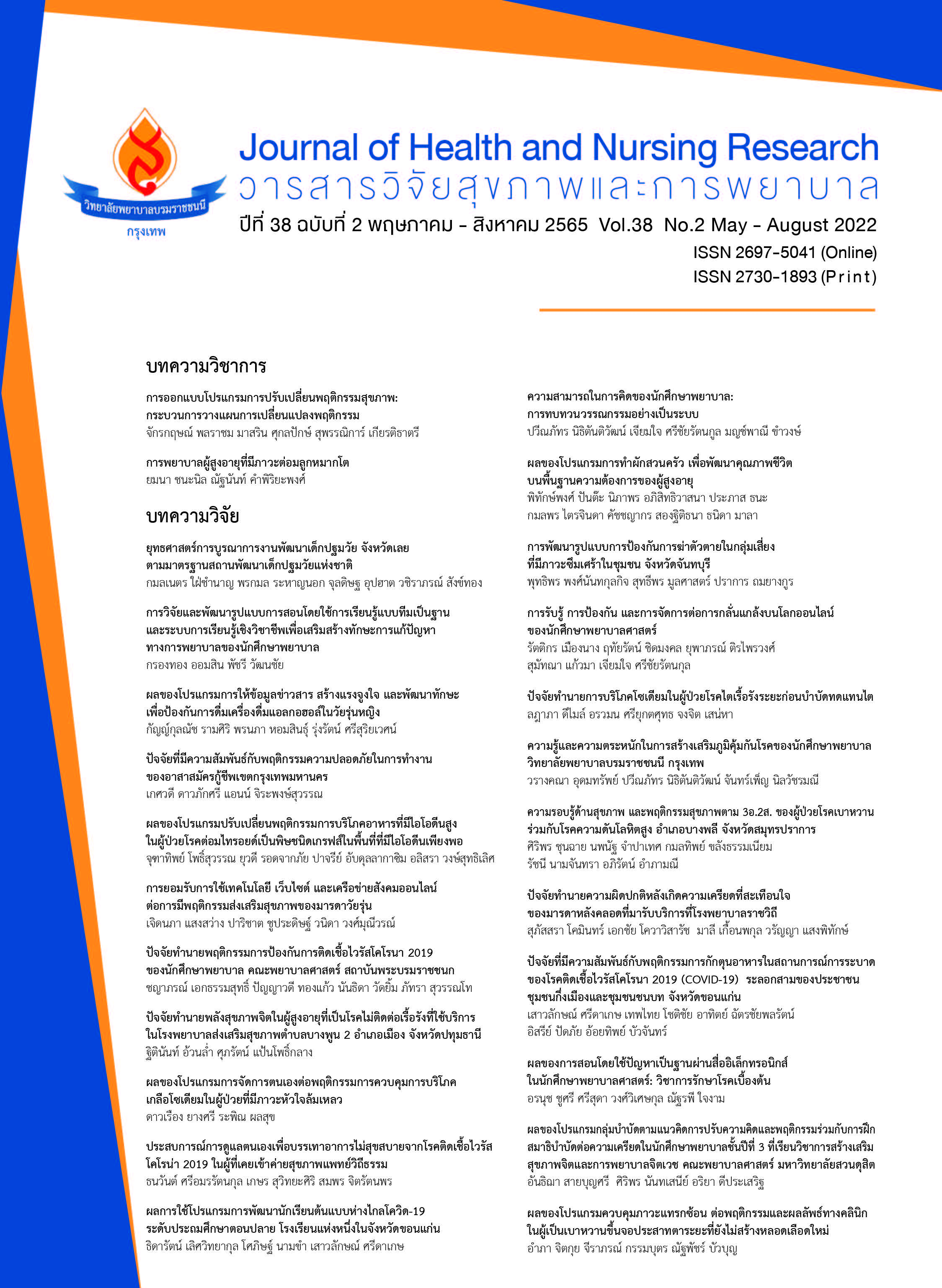ปัจจัยทำนายการบริโภคโซเดียมในผู้ป่วยโรคไตเรื้อรังระยะก่อนบำบัดทดแทนไต
คำสำคัญ:
โรคไตเรื้อรังระยะก่อนบำบัดทดแทนไต , แบบแผนความเชื่อด้านสุขภาพ , การบริโภคโซเดียม , การควบคุมความดันโลหิตบทคัดย่อ
บทนำ: อุบัติการณ์โรคไตเรื้อรังเพิ่มสูงขึ้นทั่วโลก รวมถึงประเทศไทย ผู้ป่วยส่วนใหญ่มีการบริโภคโซเดียมเกินปริมาณที่แนะนำ และยังไม่สามารถควบคุมความดันโลหิตได้ตามเป้าหมาย แนวคิดความเชื่อด้านสุขภาพมีความสำคัญในการปรับเปลี่ยนพฤติกรรมสุขภาพนำไปสู่การชะลอความเสื่อมของไต
วัตถุประสงค์การวิจัย: เพื่อศึกษาอำนาจการทำนายของปัจจัยที่ศึกษาต่อการบริโภคโซเดียม รวมถึงศึกษาความสัมพันธ์ระหว่างการบริโภคโซเดียมต่อการควบคุมความดันโลหิตในผู้ป่วยโรคไตเรื้อรังระยะก่อนบำบัดทดแทนไต
ระเบียบวิธีวิจัย: การศึกษาครั้งนี้เป็นการศึกษาความสัมพันธ์เชิงทำนาย โดยใช้กรอบแนวคิดแบบแผนความเชื่อด้านสุขภาพ (Health Belief Model) ร่วมกับการทบทวนวรรณกรรม กลุ่มตัวอย่างเป็นผู้ป่วยโรคไตเรื้อรัง อายุ 18 ปีขึ้นไป และยังไม่ได้รับการบำบัดทดแทนไตที่มารับการรักษาแผนกผู้ป่วยนอก ห้องตรวจเฉพาะโรคอายุรกรรม (โรคไต) จำนวน 118 ราย เก็บรวบรวมข้อมูลโดยแบบสอบถามข้อมูลส่วนบุคคล แบบสอบถามความรู้เกี่ยวกับการบริโภคอาหารที่มีโซเดียม แบบสอบถามความเชื่อด้านสุขภาพ แบบบันทึกการบริโภคอาหารย้อนหลัง 24 ชั่วโมง และเครื่องวัดความดันโลหิต วิเคราะห์ข้อมูลโดยใช้สถิติเชิงพรรณนา สถิติถดถอยพหูคูณ และสถิติไค-สแควร์
ผลการวิจัย: ปัจจัยด้านความรู้เกี่ยวกับการบริโภคโซเดียม การรับรู้โอกาสเสี่ยง และการรับรู้ความรุนแรงของภาวะความดันโลหิตสูง การรับรู้ประโยชน์ การรับรู้อุปสรรค และการรับรู้สมรรถนะแห่งตนต่อการลดการบริโภคโซเดียม สามารถร่วมกันทำนายการบริโภคโซเดียมของกลุ่มตัวอย่างได้ร้อยละ 11.2 (R2 = .112, F (6,111) = 2.324, p = .038) โดยพบว่าปัจจัยที่สามารถทำนายการบริโภคโซเดียม อย่างมีนัยสำคัญทางสถิติ คือ การรับรู้สมรรถนะแห่งตนต่อการลดการบริโภคโซเดียม (β = -.306, p = .001) รวมถึงการบริโภคโซเดียมไม่มีความสัมพันธ์กับการควบคุมความดันโลหิตในผู้ป่วยโรคไตเรื้อรังระยะก่อนบำบัดทดแทนไต
สรุปผล: ผู้ป่วยโรคไตเรื้อรังระยะก่อนบำบัดทดแทนไตที่มีการรับรู้สมรรถนะแห่งตนสูงมีแนวโน้มบริโภคโซเดียมลดลง
ข้อเสนอแนะ: จากผลการศึกษาปัจจัยทำนาย พยาบาลและบุคลากรทางสุขภาพอื่นควรให้ความสำคัญ และส่งเสริมการรับรู้สมรรถนะแห่งตนในการปฏิบัติการพยาบาลเพื่อส่งเสริมการบริโภคโซเดียมที่เหมาะสมในผู้ป่วยโรคไตเรื้อรังระยะก่อนบําบัดทดแทนไต อีกทั้งควรมีการติดตามประเมินการบริโภคโซเดียม และการควบคุมความดันโลหิตอย่างต่อเนื่องในระยะยาว
Downloads
เอกสารอ้างอิง
Xie Y, Bowe B, Mokdad AH, Xian H, Yan Y, Li T, et al. Analysis of the global burden of disease study highlights the global, regional, and national trends of chronic kidney disease epidemiology from 1990 to 2016. Kidney International. 2018;94(3):567-81.
Bikbov B, Purcell CA, Levey AS, Smith M, Abdoli A, Abebe M, et al. Global, regional, and national burden of chronic kidney disease, 1990–2017: A systematic analysis for the global burden of disease study 2017. The Lancet. 2020;395(10225):709-33.
Arnett DK, Blumenthal RS, Albert MA, Buroker AB, Goldberger ZD, Hahn EJ, et al. 2019 ACC/AHA guideline on the primary prevention of cardiovascular disease: A report of the American College of Cardiology/American Heart Association task force on clinical practice guidelines. Journal of the American College of Cardiology. 2019;74(10):177-232.
Zhang W, Shi W, Liu Z, Gu Y, Chen Q, Yuan W, et al. A nationwide cross-sectional survey on prevalence, management, and pharmacoepidemiology patterns on hypertension in Chinese patients with chronic kidney disease. Scientific Reports. 2016;6(1):1-10.
Schneider MP, Hilgers KF, Schmid M, Hubner S, Nadal J, Seitz D, et al. Blood pressure control in chronic kidney disease: A cross-sectional analysis from the German chronic kidney disease (GCKD) study. PloS ONE. 2018;13(8):1-17.
Garofalo C, Borrelli S, Provenzano M, De Stefano T, Vita C, Chiodini P, et al. Dietary salt restriction in chronic kidney disease: A meta-analysis of randomized clinical trials. Nutrients. 2018;10(6):1-15.
Levin A, Stevens PE, Bilous RW, Coresh J, Francisco AL, Jong PE, et al. Kidney Disease: Improving Global Outcomes (KDIGO) CKD workgroup. KDIGO 2012 clinical practice guideline for the evaluation and management of chronic kidney disease. Kidney International Supplements. 2013;3(1):1-150.
Niyomchit C, Aekwarangkoon S, Noonil N, Jantasuwan R. Relationship between sodium consumption behavior and kidney function in diabetes patients with chronic kidney disease. Songklanagarind Journal of Nursing. 2019;39(3):103-14.(in Thai).
Wang Y, Yu F, Bao Y, Zhang L, Wang H. Factors impacting sodium restriction in patients with chronic kidney disease: A cohort study from a Chinese center. International Urology and Nephrology. 2016;48(5):745-9.
Institute of Nutrition, Mahidol University. INMUCAL-Nutrients V.4.0. Nakhon Pathom2018. (in Thai).
Rosenstock IM, Strecher VJ, Becker MH. Social learning theory and the health belief model. Health Education Quarterly. 1988;15(2):175-83.
Stamler J, Chan Q, Daviglus ML, Dyer AR, Horn L, Garside DB, et al. Relation of dietary sodium (salt) to blood pressure and its possible modulation by other dietary factors: The INTERMAP study. Hypertension. 2018;71(4):631-7.
Kamran A, Azadbakht L, Sharifirad G, Mahaki B, Sharghi A. Sodium intake, dietary knowledge, and illness perceptions of controlled and uncontrolled rural hypertensive patients. International Journal of Hypertension. 2014; 2014:1-7.
Griffiths J, Putthinoi S, Pongsaksri M. The general practitioner assessment of cognition; GPCOG (Thai Version): Validity and reliability: Faculty of Associated Medical Sciences, Chiang Mai University; 2013. (in Thai).
Boonsiri C, Piaseu N, Putwatana P, Kantachuvesiri S. Effects of program promoting food consumption for sodium reduction on knowledge and urinary sodium in nursing students. Thai Journal of Nursing Council. 2017;32(3):104-19. (in Thai).
Luemongkol K, Ruaisungnoen W. Factors associated with salt restriction among patients with heart failure. Journal of Nursing and Health Care. 2017;35(2):98-110. (in Thai).
Chonsin P, Kaveevivitchai C, Neelapaichi N, Piaseu N. Impact of a blood pressure regulating program on health beliefs, health behaviour, amount of sodium intake and hypertension levels in community members with hypertension. Thai Journal of Nursing Council. 2016;31(4):63-75. (in Thai).
Komcheab J, Jitpanya C. Relationships among knowledge, perceived barriers, perceived benefit, social support, self-efficacy, and sodium consumption behaviors in heart failure patients [dissertation]. Bangkok: Chulalongkorn University; 2013. (in Thai).
Thai Hypertension Society. Thai hypertension society: Guidelines in the treatment of hypertension 2019. Nonthaburi: Think Beyond Book; 2019. (in Thai).
Clark-Cutaia MN, Ren D, Hoffman LA, Burke LE, Sevick MA. Adherence to hemodialysis dietary sodium recommendations: Influence of patient characteristics, self-efficacy, and perceived barriers. Journal of Renal Nutrition. 2014;24(2):92-9.
Meuleman Y, Hoekstra T, Dekker FW, Boog P, Dijk S. Perceived sodium reduction barriers among patients with chronic kidney disease: Which barriers are important and which patients experience barriers. International Journal of Behavioral Medicine. 2018;25(1):93-102.
Chen J, Liao Y, Li Z, Tian Y, Yang S, He C, et al. Determinants of salt restriction spoon using behavior in China: Application of the Health Belief Model. PLoS ONE. 2013;8(12):1-9.
Walsh E, Lehane E. An exploration of the relationship between adherence with dietary sodium restrictions and health beliefs regarding these restrictions in Irish patients receiving hemodialysis for end-stage renal disease. Journal of Clinical Nursing. 2011;20(3-4):331-40.
Chung ML, Park L, Frazier SK, Lennie TA. Long-term adherence to low sodium diet in patients with heart failure. Western Journal of Nursing Research. 2017;39(4):553-67.
Land MA, Webster J, Christoforou A, Praveen D, Jeffery P, Chalmers J, et al. Salt intake was assessed by 24 h urinary sodium excretion in a random and opportunistic sample in Australia. British Medical Journal. 2014;4(1):1-7.
Ito T, Takeda M, Hamano T, Kijima T, Yamasaki M, Isomura M, et al. Effect of salt intake on blood pressure in patients receiving antihypertensive therapy: Shimane coHER Study. European Journal of Internal Medicine. 2016; 28:70-3.
Yoon CY, Noh J, Lee J, Kee YK, Seo C, Lee M, et al. High and low sodium intakes are associated with incident chronic kidney disease in patients with normal renal function and hypertension. Kidney International. 2018;93(4):921-31.
ดาวน์โหลด
เผยแพร่แล้ว
รูปแบบการอ้างอิง
ฉบับ
ประเภทบทความ
สัญญาอนุญาต
ลิขสิทธิ์ (c) 2022 วารสารวิจัยสุขภาพและการพยาบาล (วารสารวิทยาลัยพยาบาลบรมราชชนนี กรุงเทพ)

อนุญาตภายใต้เงื่อนไข Creative Commons Attribution-NonCommercial 4.0 International License.
บทความที่ได้รับการตีพิมพ์ เป็นลิขสิทธิ์ของวารสารวิจัยสุขภาพและการพยาบาล (วิทยาลัยพยาบาลบรมราชชนนี กรุงเทพ) ไม่สามารถนำไปตีพิมพ์ซ้ำในวารสารฉบับอื่น


















